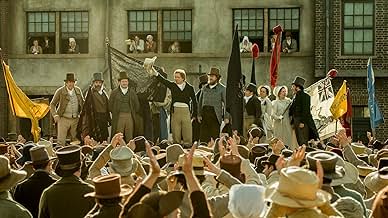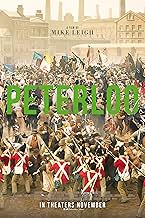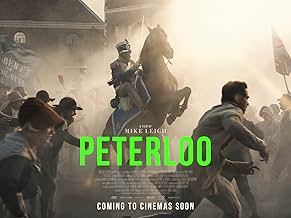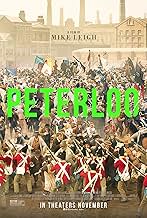IMDb RATING
6.5/10
5.8K
YOUR RATING
The story of the 1819 Peterloo Massacre in which British forces attacked a peaceful pro-democracy rally in Manchester.The story of the 1819 Peterloo Massacre in which British forces attacked a peaceful pro-democracy rally in Manchester.The story of the 1819 Peterloo Massacre in which British forces attacked a peaceful pro-democracy rally in Manchester.
- Awards
- 4 wins & 8 nominations total
- Director
- Writer
- All cast & crew
- Production, box office & more at IMDbPro
Featured reviews
"Rise like Lions after slumber in unvanquishable number- Shake your chains to earth like dew Which in sleep had fallen on you- Ye are many-they are few." Shelley, from The Masque of Anarchy
No contemporary director depicts and loves the working class better than Mike Leigh: look at Secrets and Lies for the best example. Believing that not enough people know about the massacre in 1819 in Manchester, where the British army slaughtered 18 and wounded scores of commoners peacefully assembling for liberty and rights, Leigh filmed Peterloo, the popular name for the uprising.
With an ear for local locutions and pompous preening, Leigh alternates between the people and their monarchial rulers, showing the sincerity of the marchers and the fear of the magistrates, who wish for nothing more than a Waterloo to stem the French-revolution-like yearnings of the folk. When administrators order the soldiers to squash the gathering, it's the beginning of responsible press reporting the malignity of entrenched rulers.
Leigh's longtime cinematographer, Dick Pope, has exceptional shots of the laborers and their homes to rival the best work of Millet and Courbet. The framing arches and rolling fields provide Pope with contours and colors to complement the dignity and vitality of the people.
However, it's Leigh's unfailing ear for diction and eye for metaphor that distinguish him as a David Lean of the working class. Contrasting the magistrates clustered around drafting the warrants for the crowd and the almost lyrical happiness of the assembly not only sets up the worlds of sad and happy, but they also heighten the terror as the innocent are vanquished by the proud.
Out of this debacle came a strong press that began and never stopped evaluating the ruling class. All hail the emergence of the Manchester Guardian.
"Let a great Assembly be Of the fearless and the free On some spot of English ground Where the plains stretch wide around." Shelley
No contemporary director depicts and loves the working class better than Mike Leigh: look at Secrets and Lies for the best example. Believing that not enough people know about the massacre in 1819 in Manchester, where the British army slaughtered 18 and wounded scores of commoners peacefully assembling for liberty and rights, Leigh filmed Peterloo, the popular name for the uprising.
With an ear for local locutions and pompous preening, Leigh alternates between the people and their monarchial rulers, showing the sincerity of the marchers and the fear of the magistrates, who wish for nothing more than a Waterloo to stem the French-revolution-like yearnings of the folk. When administrators order the soldiers to squash the gathering, it's the beginning of responsible press reporting the malignity of entrenched rulers.
Leigh's longtime cinematographer, Dick Pope, has exceptional shots of the laborers and their homes to rival the best work of Millet and Courbet. The framing arches and rolling fields provide Pope with contours and colors to complement the dignity and vitality of the people.
However, it's Leigh's unfailing ear for diction and eye for metaphor that distinguish him as a David Lean of the working class. Contrasting the magistrates clustered around drafting the warrants for the crowd and the almost lyrical happiness of the assembly not only sets up the worlds of sad and happy, but they also heighten the terror as the innocent are vanquished by the proud.
Out of this debacle came a strong press that began and never stopped evaluating the ruling class. All hail the emergence of the Manchester Guardian.
"Let a great Assembly be Of the fearless and the free On some spot of English ground Where the plains stretch wide around." Shelley
16 August 2019 is the 200th anniversary of the Peterloo massacre in Manchester.
Peterloo begins after Napoleon's defeat in Waterloo in 1815. Joseph is a young shell shocked soldier who returns home to Manchester to no job and no prospects. The spoils of victory is only shared by the wealthy. The poor suffer increased prices due to the corn laws.
Voting rights also belong to the rich and the powerful. The ordinary man wants the extension of the franchise and parliamentary reform, the wealthy resist. They also fear that a visit to Manchester from orator and reformer Henry Hunt (Rory Kinnear) will lead the rabble to riot. The local gentry and magistrates are intent on putting down any protest and have the army on standby. On the fateful day the army panics leading to the deaths of 18 people and many hundreds injured even though the protest was peaceful.
Mike Leigh intended to make a working class epic that is still relevant today. There is humour, Hunt is a rich pompous dandy who himself is unable to connect to the ordinary man he likes to champion. However much of the film feels like a sermon with long lengthy speeches and ideals which repeat themselves. The landed, the military and the judges are painted as two dimensional baddies with only one possible exception. It also has a very strong Lancashire dialect, which some might find difficult to follow.
Leigh does add intrigue. Radical agitators are watched by government spies. Letters are intercepted by the Home Office.
Peterloo is an angry film to commemorate a terrible event. It is wonderfully shot but its running time needed to be drastically reduced and some of the speeches needed to be cut down. As for young Joseph, his fate was signposted.
Peterloo begins after Napoleon's defeat in Waterloo in 1815. Joseph is a young shell shocked soldier who returns home to Manchester to no job and no prospects. The spoils of victory is only shared by the wealthy. The poor suffer increased prices due to the corn laws.
Voting rights also belong to the rich and the powerful. The ordinary man wants the extension of the franchise and parliamentary reform, the wealthy resist. They also fear that a visit to Manchester from orator and reformer Henry Hunt (Rory Kinnear) will lead the rabble to riot. The local gentry and magistrates are intent on putting down any protest and have the army on standby. On the fateful day the army panics leading to the deaths of 18 people and many hundreds injured even though the protest was peaceful.
Mike Leigh intended to make a working class epic that is still relevant today. There is humour, Hunt is a rich pompous dandy who himself is unable to connect to the ordinary man he likes to champion. However much of the film feels like a sermon with long lengthy speeches and ideals which repeat themselves. The landed, the military and the judges are painted as two dimensional baddies with only one possible exception. It also has a very strong Lancashire dialect, which some might find difficult to follow.
Leigh does add intrigue. Radical agitators are watched by government spies. Letters are intercepted by the Home Office.
Peterloo is an angry film to commemorate a terrible event. It is wonderfully shot but its running time needed to be drastically reduced and some of the speeches needed to be cut down. As for young Joseph, his fate was signposted.
A slow work up to the massacre. Incredible massacre scene. Would have like more on the aftermath as the film ended abruptly. Overlong I thought.
Like most working-class Brits, I knew nothing of Peterloo (and I am from Manchester into the bargain).
Mike Leigh has done an excellent job, documenting this momentous event in British history, an event conveniently airbrushed out of my secondary school education. Imagine that.
A good 2.5 hrs long, it would make a decent 12 part Netflix drama. Though, he'd never get the funding for that.
It is long, it is educational, it is historical, it is incredibly worthy. Watch it and draw parallels with the Britain of today. FPTP electoral system, zero-hours contracts, food banks, Brexit, et al.
i gave it a 9.
Mike Leigh has done an excellent job, documenting this momentous event in British history, an event conveniently airbrushed out of my secondary school education. Imagine that.
A good 2.5 hrs long, it would make a decent 12 part Netflix drama. Though, he'd never get the funding for that.
It is long, it is educational, it is historical, it is incredibly worthy. Watch it and draw parallels with the Britain of today. FPTP electoral system, zero-hours contracts, food banks, Brexit, et al.
i gave it a 9.
As with most movies today, the extremes are over-represented and the underlying issues barely addressed. England was reeling from a Napoleanic, banker-funded war, ending in oppressive debt for the major powers of Europe. The Bank of England and the Bank of France were both formed to lend money to their respective governments, with few constraints on the pyramiding, in order to fund regular wars. The French revolution was trying to spread its socialist conclusions. Men are represented as either cruel, money-grubbing wealthy industrialists or poor, woe-is-me peasant labor, although one could hardly call people who had several sets of clothes, a house and sets of dishes as poor. The gratuitous men-oppress-their-more-intelligent-women folk is consistent with modern social justice bleatings. Consequently, what we see is the plight of what the French called the bourgeoisie, or the merchant and skilled labor class. The entrenched oligarchies were hanging on to their power, generated by industrial technological expansions (in this case the mechanical loom), which ironically needed skilled laborers and supporting merchants, who also were gaining wealth, counter to the woe-is-me picture. Much of the problem was the government-imposed lack of producers' and laborers' ability to negotiate the price of their labor and the markets for their products. The many government-oligopoly controls on cloth production are not presented, but were responsible for most of the tension. Of course, these issues would hardly sell to uninformed viewers.
As with the onset of the French revolution, the key issue is never quite resolved in these movies, or in the social justice bleatings of today: after the dust settles, who will be in charge and what will the new rules be? Will the current oppressors be replaced by worse oppressors? Meet the new boss, same as the old boss, both in labor and management. Government meddling has and will cause tragedy.
As with the onset of the French revolution, the key issue is never quite resolved in these movies, or in the social justice bleatings of today: after the dust settles, who will be in charge and what will the new rules be? Will the current oppressors be replaced by worse oppressors? Meet the new boss, same as the old boss, both in labor and management. Government meddling has and will cause tragedy.
Did you know
- TriviaThe film was released 200 years after the Peterloo Massacre.
- GoofsThe young Waterloo veteran who continues to wear his redcoat during the film can be seen in one shot with Corporal stripes whereas the rest of the film his tunic is that of a Private.
- Quotes
Prince Regent: I know what is good for my people better than they know themselves!
- ConnectionsFeatured in Granada Reports: 16 August 2018: Evening Bulletin (2018)
Details
- Release date
- Country of origin
- Official sites
- Language
- Also known as
- La tragèdia de Peterloo
- Filming locations
- Hebden Bridge, West Yorkshire, England, UK(Workers being drilled before marching)
- Production companies
- See more company credits at IMDbPro
Box office
- Gross US & Canada
- $151,971
- Opening weekend US & Canada
- $26,002
- Apr 7, 2019
- Gross worldwide
- $2,159,214
- Runtime
- 2h 34m(154 min)
- Color
- Sound mix
- Aspect ratio
- 1.85 : 1
Contribute to this page
Suggest an edit or add missing content








































